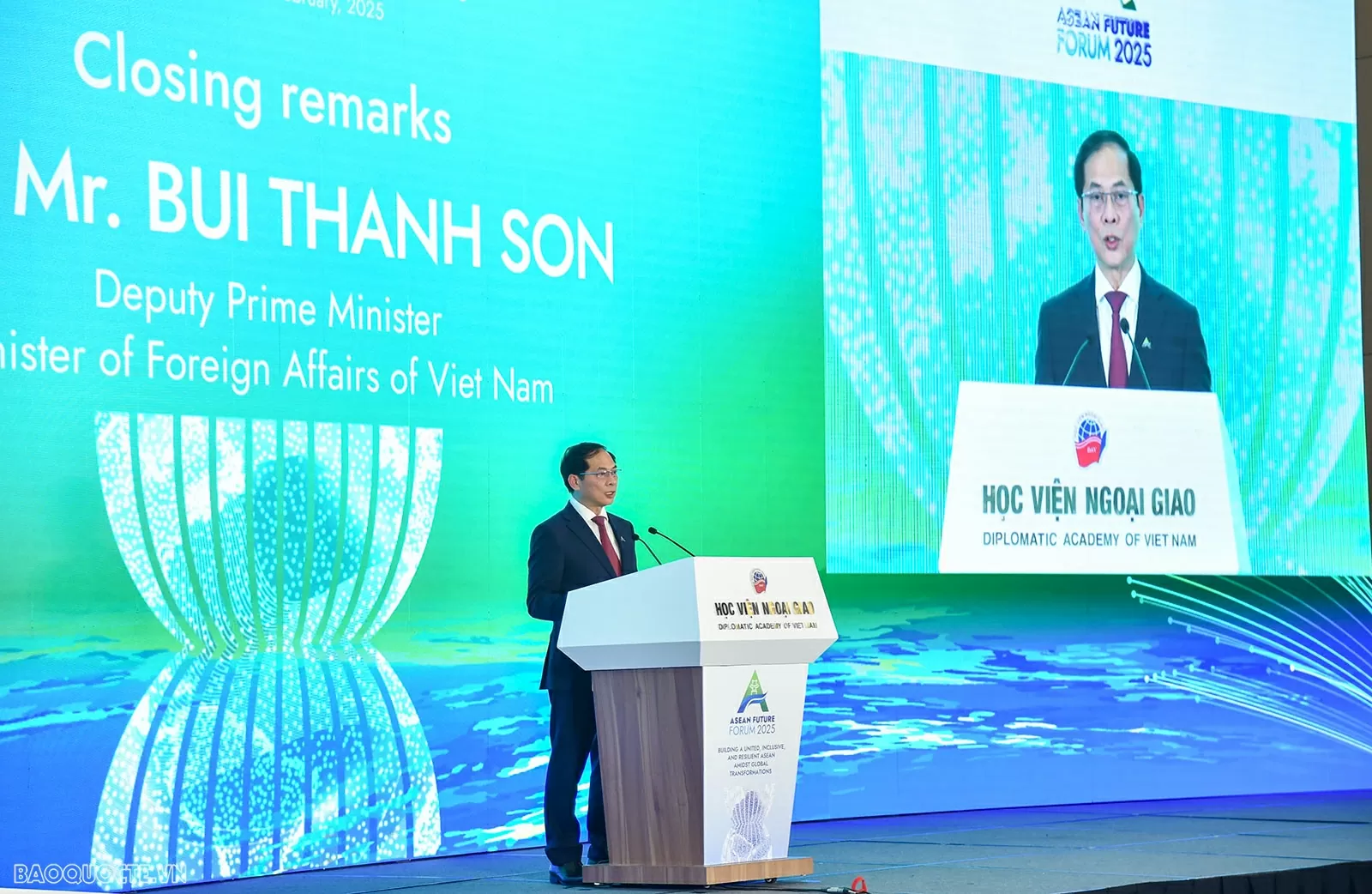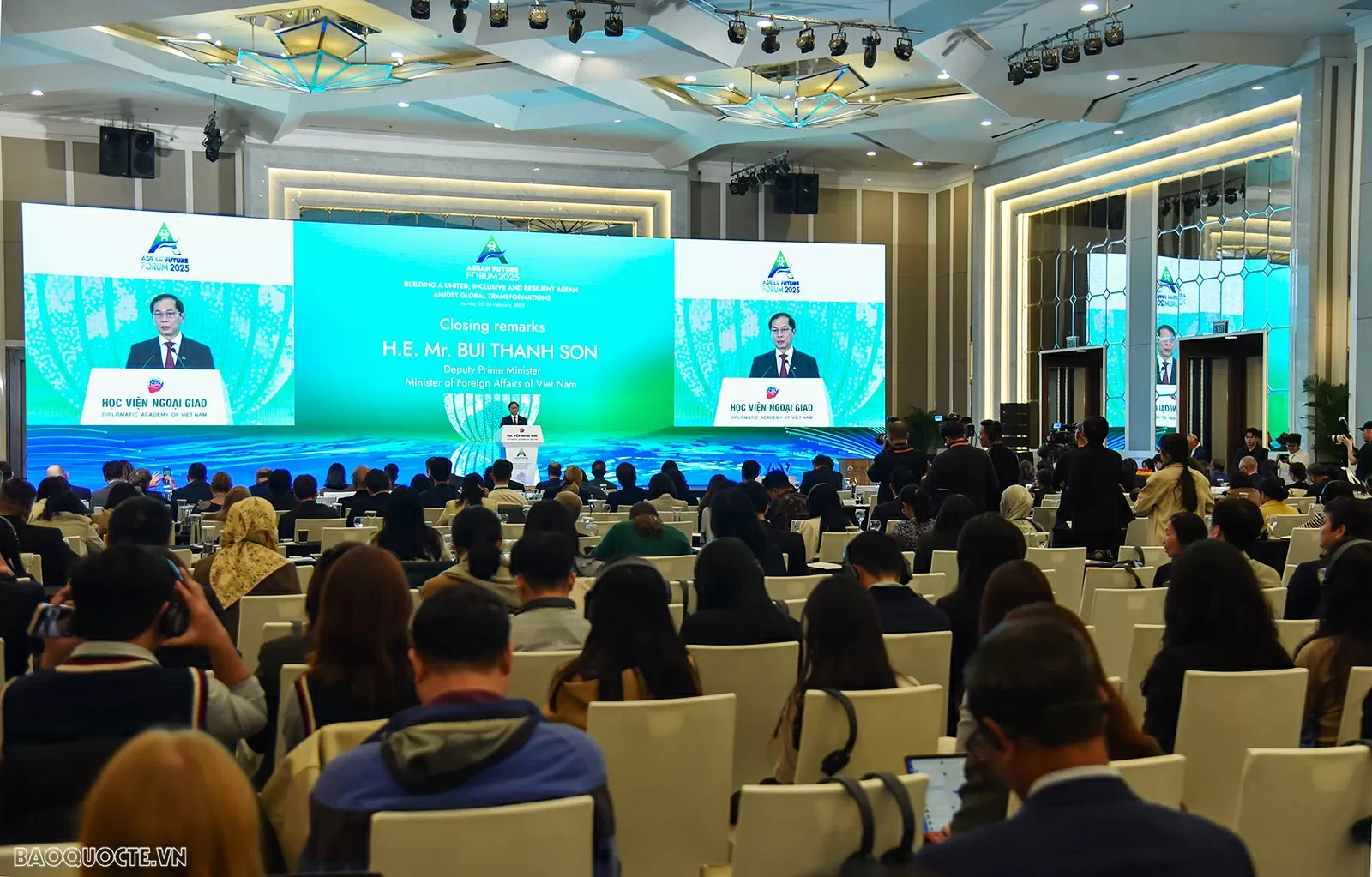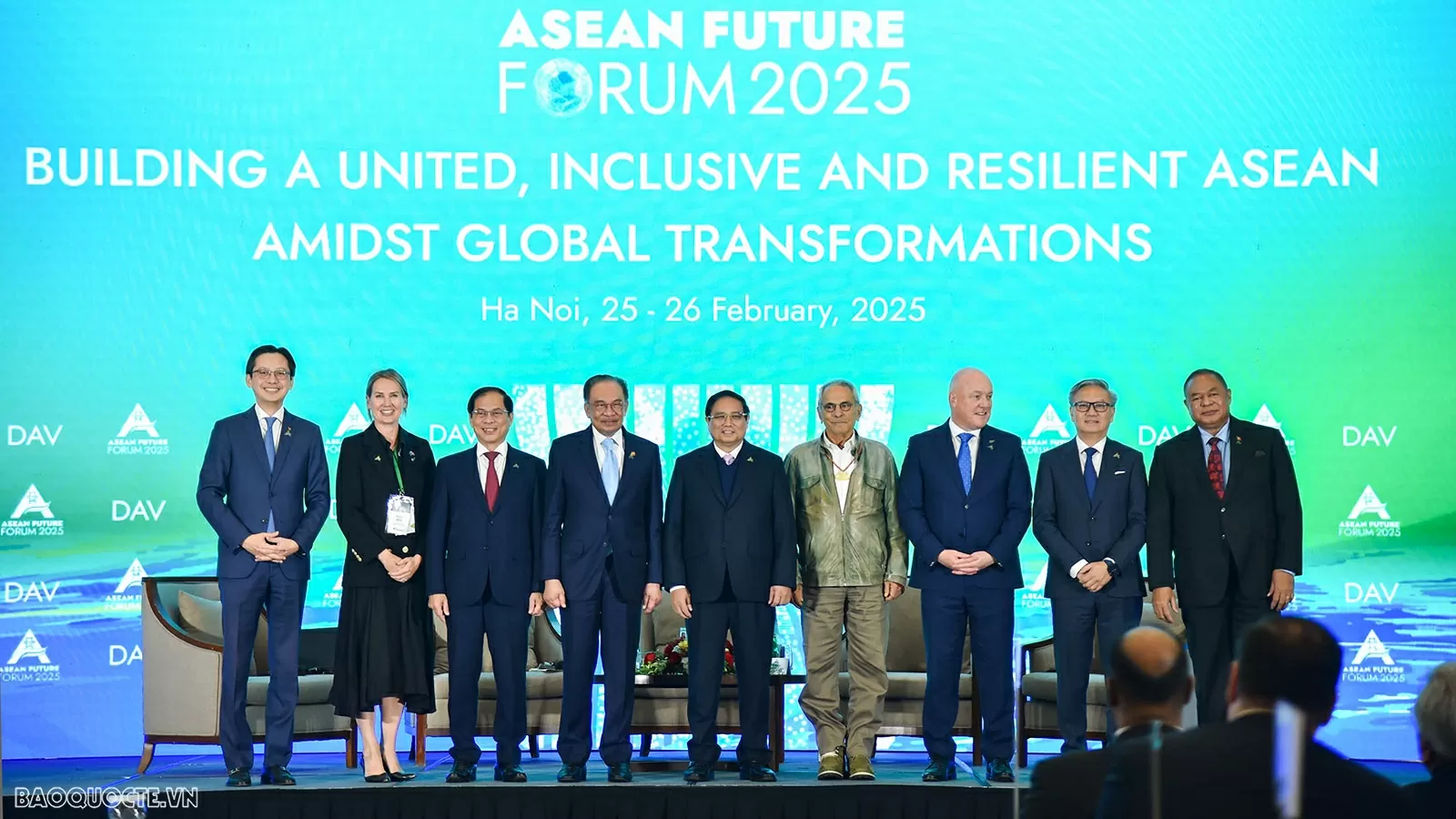
ASEAN Future Forum: Deputy PM Bui Thanh Son's closing remarks on stronger commitment to building a united, inclusive, and resilient ASEAN
Latest
 |
| Deputy Prime Minister and Minister of Foreign Affairs Bui Thanh Son speaks at the event (Photo: Tuan Anh) |
In his closing remarks, Deputy Prime Minister and Minister of Foreign Affairs Bui Thanh Son emphasised that the forum had successfully fulfilled its ambitious agenda. Hundreds of contributions and insightful recommendations were put forward, helping address critical issues ranging from major global trends and the role of women in peacebuilding to reviewing ASEAN’s fundamental principles and governing emerging technologies.
The engaging atmosphere and spirited discussions, with some sessions running well their scheduled time, reflect both the urgency of the challenges facing countries in the region as well as the collective determination to address them, Deputy Prime Minister Son commented.
The Forum has reached several clear areas of consensus through in-depth discussions, the Deputy Prime Minister summerized.
First, the global order is undergoing profound transformations, marked by unprecedented uncertainties and complexities. Recent developments in major power relations serve as testament to this shifting lanscape. "For ASEAN, navigating this uncertain transition in the global order may well be the defining challenge for our generations", the Deputy Prime Minister emphasized.
Second, the breakthrough and sometimes unpredictable impacts of technological advancements, especially those driven by the Fourth Industrial Revolution, including artificial intelligence (AI), big data, and the Internet of Things (IoT). “Without swift preparation, we risk falling further behind. Similar developments will accelerate, fundamentally reshaping economies and societies in ways we are only beginning to comprehend”, he noted.
Third, the growing significance of non-traditional security challenges. The intensifying impact of cyber threats, climate change, and the profound socio-economic implications of rapid aging societies, requiring innovative responses that go beyond national boundaries and resource mobilization at the highest level.
Fourth, while ASEAN faces unprecedented challenges in this period of global transformation, these challenges also present opportunities to demonstrate the group’s collective strength and enduring relevance. "With unity and centrality as our core values, ASEAN can maintain its role as an honest broker, a strategic convener of dialogue, and ‘a beacon of hope’, as Malaysian Prime Minister Anwar Ibrahim put it, for sustainable development, open regionalism, and a rules-based order," the Deputy Prime Minister emphasized.
 |
| Overview of the closing session. (Photo: Tuan Anh) |
The forum has also highlighted several areas where dialogue and careful consideration are needed, according to Deputy Prime Minister Son. How should ASEAN uphold its key principles and core values while evolving and adapting itself to timely respond to ongoing global transformation?” The Deputy Prime Minister raised the issue and cited a number of opinions advocating bold approaches such as applying the 10-X model even in ASEAN's political and security pillars, including addressing the Myanmar issue, while others emphasize the need for ASEAN to maintain its current decision-making mechanism based on consensus and principle of non-interference.
The Deputy Prime Minister reaffirmed that in recent years, ASEAN has engaged in extensive discussions on refining its decision-making process to enhance effectiveness. This topic continues to be raised in exchanges among institutions and scholars. After nearly 60 years, ASEAN has sustained its role, credibility, and centrality largely due to its consistent adherence to the principle of consensus-building.
“In this context, I am particularly interested in the productive closed-door Retreat among ASEAN scholars and experts regarding the situation in Myanmar—a demonstration of our commitment to finding ASEAN-owned, ASEAN-led solutions to regional challenges through constructive dialogue, collective wisdom, and innovative ideas,” he mentioned.
The discussions also raised fundamental questions about ASEAN’s role in an increasingly fragmented world. While some advocated for a more proactive global role, others emphasize the importance to focus on strengthening internal cohesion and inter-regional integration.
The path forward requires significant commitments. The Deputy Prime Minister stressed the need to maintain and strengthen ASEAN’s unity, resilience, and inclusivity—principles that Prime Minister Pham Minh Chinh emphasized in his opening speech, which have been the bedrock of regional success.
Deputy Prime Minister Son also highlighted the need to commit to enhancing investments in clinical technologies and developing common position on the governance of emerging technologies. “Ultimately, only new technology can help our region to escape the middle-income trap and ensure that no one is left behind”, he stressed.
Thematic discussions at the forum have unanimously agreed that ASEAN’s development must be driven by science and technology as the key instruments to propel the entire region forward. Therefore, it is needed to made strong investments in human capital, infrastructure for high-tech development, and partnerships with key players in science and technology, including semiconductors, AI, and other critical fields. While it may need to be more flexible in applying foundational principles, ASEAN has remained steadfast in preserving their core essence.
Finally, given "ASEAN’s centrality must be earned and continuously reinforced”,"we should strive to innovate in the way we assert ASEAN’s centrality in the regional architecture and manage our relationship with external partners, including major powers," proposed Deputy Prime Minister Son.
He noted that the Forum benefitted greatly from diverse perspectives. The active participation and fresh insights from all delegates, including many young scholars, have enriched the deliberations and highlighted the international community’s strong interest in ASEAN’s future trajectory.
 |
| Prime Minister Pham Minh Chinh, the Timor-Lester President, the Malaysian Prime Minister and the Prime Mnister of New Zealand take a group photo at High-level prenary session on February 26 morning. (Photo: Tuan Anh) |
"As ASEAN finalizes its Strategic Program for the ASEAN Community Vision 2045, the insights and recommendations from this Forum will serve as valuable input. Therefore, I propose that we prepare a summary report of the Forum with all valuable recommendations and send it to the ASEAN Secretariat for further dissemination and reference by relevant ASEAN bodies and agencies”, Deputy Prime Minister suggested.
As the ASEAN Future Forum has come to a fruitful conclusion, the Deputy Prime Minister expressed his confidence that this Forum will truly become a premier incubator of innovative ideas for the region’s future. “Let us leave today’s Forum with a stronger commitment to building a united, inclusive, and resilient ASEAN—not just for our time, but for generations to come," Deputy Prime Minister and Foreign Minister Son concluded.
In the afternoon the same day, the Forum continued with the fourth plenary session on governing emerging technologies to ensure comprehensive security, followed by the fifth plenary session on ASEAN's role in fostering cohesion and promoting peace in a fragmented world.















